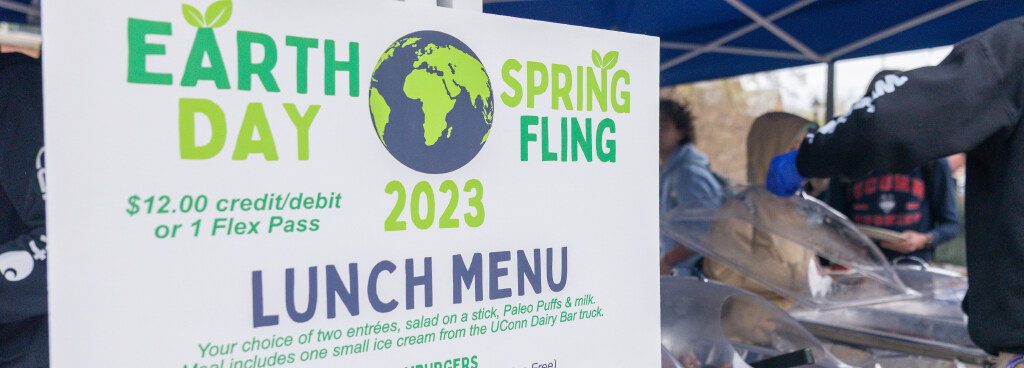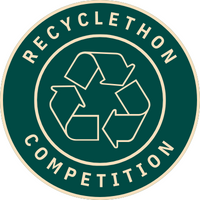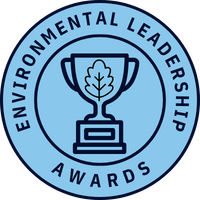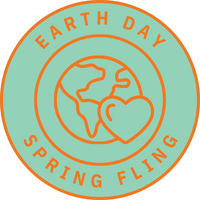
Educational Engagement Events

Annual Office of Sustainability events engage UConn students and spur their sustainability journeys. Our events and programs reach a full spectrum of students, from those who are unaware of sustainability concepts, all the way to activist students while guiding students toward greater expertise. These events are key to fostering sustainability community at UConn.
EcoMadness
 EcoMadness is a month-long, campus-wide initiative to reduce energy and water usage while increasing recycling in the form of a competition between residence halls. Many campus buildings are equipped with meters that measure the amount of water (in gallons) and the amount of energy (in kilowatt-hours) per day. (Some residence halls are not metered, but they can still win prizes for recycling. If your building is not metered, you can still participate! Check here to see if your building is metered.) The numbers for the amount of water and energy are divided by the number of students in the building so we can calculate the water and energy usage per capita in each dorm.
EcoMadness is a month-long, campus-wide initiative to reduce energy and water usage while increasing recycling in the form of a competition between residence halls. Many campus buildings are equipped with meters that measure the amount of water (in gallons) and the amount of energy (in kilowatt-hours) per day. (Some residence halls are not metered, but they can still win prizes for recycling. If your building is not metered, you can still participate! Check here to see if your building is metered.) The numbers for the amount of water and energy are divided by the number of students in the building so we can calculate the water and energy usage per capita in each dorm.
The dorm standings are updated once per week during the October competition so that participants can keep track of their progress over the four weeks of the competition. At the end of the competition, the winner of each category-electricity, water, and recycling- wins free Dairy Bar ice cream!
Outcomes:
- ~20% reduction in electricity use
- ~30% reduction in water use
- Enhanced recycling compliance
- Over 12,000 residential students engaged on the Storrs campus
Green Game Days

In partnership with UConn Athletics, the Office of Sustainability hosts Green Game Days at basketball and football games each year. Student interns and volunteers educate incoming fans or tailgaters about best recycling practices, and help collect cans and bottles from the parking lots at Rentschler Field or in the stands at Gampel Pavilion.
Basketball Green Game Days are held in January or February, while Football Green Game Days are held in September or October.
Outcomes:
- Better community recycling knowledge and practices
- 24 cubic yards (1,500 lbs) of recycling rescued from landfill streams annually
- UConn student sustainability community building
Haunted HEEP

The Haunted HEEP is an annual Halloween trail walk established in 2020. During this scary experience, groups of students plunge into the shadows, daring to explore the creepy scenes set up along the one mile Red Trail of the Hillside Environmental Education Park (HEEP). The HEEP is closely tied to UConn’s sustainability history – it contains a remediated landfill and provides miles of trails for the community to enjoy the physical and mental health benefits of nature.
The OS looks for student volunteers each year to help scare participants. Many clubs and organizations on campus, as well as individual volunteers, contribute to the success of the event, held at the end of October.
Outcomes:
- 1,200+ student attendees
- Enhanced sustainability connections and community at UConn
- 81% of guests had never visited the HEEP before the event
- 91% intend to visit the HEEP trails on their own in the future (during the day!)
Climate Change Cafe
 UConn sends more undergraduate students to the United Nations' global climate change negotiations (Conference of the Parties, known as COP) than any other institution. In order to bring that experience and knowledge back to the wider UConn community, the Office of Sustainability hosts the Climate Change Cafe. This is a poster and networking session featuring UConn@COP Fellows, as well as grantees from the Environmental and Social Sustainability Grants program. It is held shortly after students return from the conference in either December or January.
UConn sends more undergraduate students to the United Nations' global climate change negotiations (Conference of the Parties, known as COP) than any other institution. In order to bring that experience and knowledge back to the wider UConn community, the Office of Sustainability hosts the Climate Change Cafe. This is a poster and networking session featuring UConn@COP Fellows, as well as grantees from the Environmental and Social Sustainability Grants program. It is held shortly after students return from the conference in either December or January.
Outcomes:
- Cutting edge knowledge sharing from the world's premiere climate action hub
- Over 100 student and UConn administrators in attendance
- Building cross-UConn connections around climate action and scholarship
Green Careers Panel
 The Green Careers Panel features professionals in sustainability-related fields, ranging from engineering to governmental and nonprofit sectors. Panelists at multiple stages of the careers discuss their job paths and provide key insights to students entering the field. Networking follows the discussion portion. These have been held since 2021.
The Green Careers Panel features professionals in sustainability-related fields, ranging from engineering to governmental and nonprofit sectors. Panelists at multiple stages of the careers discuss their job paths and provide key insights to students entering the field. Networking follows the discussion portion. These have been held since 2021.
Outcomes:
- Connections with early, mid, and late-career sustainability professionals
- Better understanding of the breadth of sustainability career types available
- Professional networking experience
RecycleThon
 RecycleThon is a month-long competition in February run by the Office of Sustainability that focuses on proper recycling practices. Participating residence halls compete to see which one recycles the best! Each week, the EcoCaptain Intern for each residence hall conducts a recycling audit to assess if students are disposing of their waste properly.
RecycleThon is a month-long competition in February run by the Office of Sustainability that focuses on proper recycling practices. Participating residence halls compete to see which one recycles the best! Each week, the EcoCaptain Intern for each residence hall conducts a recycling audit to assess if students are disposing of their waste properly.
The dorm standings are updated once per week during the competition so participants can keep track of their progress over the four weeks of the competition. At the end of the competition, the residence hall that recycles the best wins free Dairy Bar ice cream!!
Learn more about recycling on campus, recycle to the best of your abilities, and take home bragging rights as the best recyclers on campus – plus free ice cream!
Outcomes:
- Enhanced recycling compliance
- Over 12,000 residential students engaged on the Storrs campus
Environmental Leadership Awards
 The Environmental Leadership Awards (ELAs) are a means of recognizing individuals or groups who have worked alone or as part of organizations to support sustainability efforts at UConn and beyond. Nominations can be submitted by faculty members, staff members, students, or external partners. Nominees are evaluated by a committee appointed by the Office of Sustainability and Institute of the Environment. Recipients of the ELAs are honored at an award ceremony commemorating their achievement.
The Environmental Leadership Awards (ELAs) are a means of recognizing individuals or groups who have worked alone or as part of organizations to support sustainability efforts at UConn and beyond. Nominations can be submitted by faculty members, staff members, students, or external partners. Nominees are evaluated by a committee appointed by the Office of Sustainability and Institute of the Environment. Recipients of the ELAs are honored at an award ceremony commemorating their achievement.
Nominations for the awards are accepted in each of the following categories:
- Undergraduate Student
- Graduate Student
- Environmental Justice
- Faculty
- Staff
- External Partner
- University Group / Team / Organization
Outcomes:
- Enhanced recognition for UConn's environmental champions
- Networking across disciplines
Earth Day Spring Fling
 Earth Day Spring Fling is an annual celebration of sustainability co-sponsored by UConn's Office of Sustainability and UConn Dining. Established in 2008, the festival features vendors of sustainable and hand-crafted goods, organic and local foods, environmental organizations, and student groups that join together to produce the greatest day of environmental awareness all year! Dining offers a special outdoor zero waste BBQ for lunch. Recent celebrations have included a party bike tour of campus sustainability features and goat yoga. Coinciding with with the event is UConn's annual Arbor Day celebration and ceremonial class tree planting. The event is held near the end of April.
Earth Day Spring Fling is an annual celebration of sustainability co-sponsored by UConn's Office of Sustainability and UConn Dining. Established in 2008, the festival features vendors of sustainable and hand-crafted goods, organic and local foods, environmental organizations, and student groups that join together to produce the greatest day of environmental awareness all year! Dining offers a special outdoor zero waste BBQ for lunch. Recent celebrations have included a party bike tour of campus sustainability features and goat yoga. Coinciding with with the event is UConn's annual Arbor Day celebration and ceremonial class tree planting. The event is held near the end of April.
Outcomes:
- 2,000+ student attendees
- Enhanced sustainability connections and community at UConn
- 30+ vendors and eco-organizations connecting with sustainability minded students
- Goat yoga memories that last forever